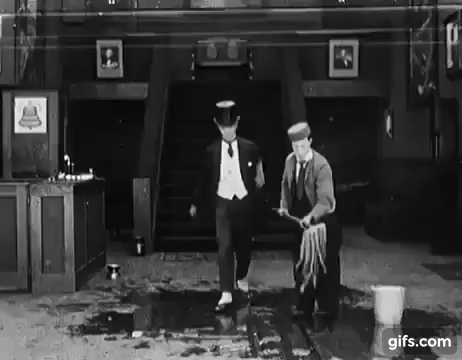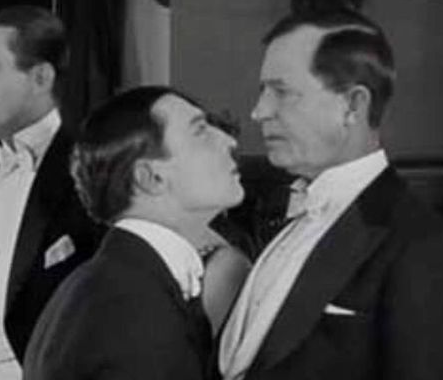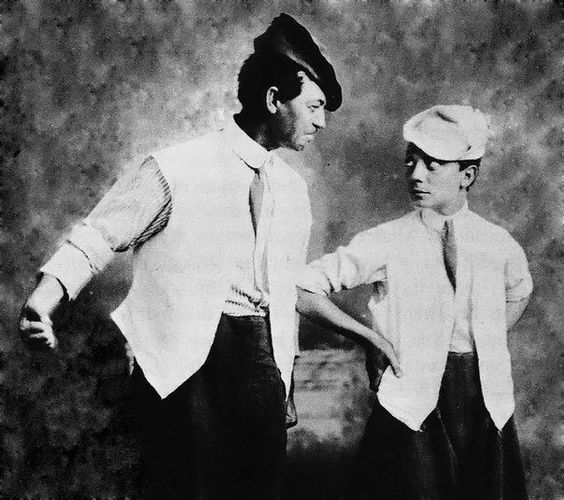I sometimes wonder what Buster would have been like with a different father. Would he have been more confrontational or less? Did Buster’s passiveness develop in the reflection of Joe’s active – even aggressive – influence? Or was creative passiveness just a part of his original personality.
Both Joe and Buster were very physical men, communicating much of themselves through action, but what different action! I have an idea it would be funny to list out all of the documented fights Joe Keaton was in (instigated). It would be a . . . very long list. And, I’m sure, still just a small sampling of his brawling lifestyle. It seems like a good quarter of what we know about Joe are the fights and feuds he got into.

And another, very understandable, reaction:

Buster mentions at least six fist/foot fights Joe participated in (instigated) and several of these describe not one skirmish, but a chunk of Joe’s fighting life: “My father got so many black eyes fighting with bigger boy bootblacks for the best street corners that he soon was nicknamed “Dick Deadeyes.” (My Wonderful World of Slapstick Pg. 16)
Most of the time Buster doesn’t seem to disapprove of his father’s fighting lifestyle. In fact, at times he seems proud: “[My father] was the most gifted man at taking a fall I ever saw in action. He was also one of the country’s best rough-and-tumble fighters.” (MWWoS Pg. 15). Many of the stories in Buster’s autobiography describe Joe brawling, not out of pure hotheadedness, but for good. (To protect Buster, to protect his children, to help out a persecuted stranger).

I was recently very kindly shown an article in which Joe describes his first day of school. I was impressed by how similarly the account read to Buster’s description of his own first day. And how differently.
Joe’s first (and only?) day of school:
“I was given a seat directly behind Jim Godsey, but I didn’t stay there long, because Jim called me a “Yap”, and I smashed him with my slate. I was moved to another part of the room and a “kid” by the name of Riley handed me the “Yap” thing and I matched one with him. My next move was to have an individual seat, all by myself, near to the teacher’s desk, where she could keep an eye on me, but little Bill Merrell placed a wet sponge under me and that split up the society. I decided to shine shoes.” (The Terre Haute Morning Star, May 30, 1904).
Buster’s first (and only) day of school:
“By nine-fifteen I was at a desk with other little boys my age and fascinated by everything I saw and heard. Unfortunately, I knew some jokes I’d heard in the Avon Comedy Four’s school act and decided to bring joy into the classroom by telling them. The teacher called the roll: “Smith?” “Here!” “Johnson?” “Here!” “Keaton?” “I couldn’t come today.”
That sent the class into an uproar and even won an appreciative smile from the teacher. Enchanted that going to school meant only putting on an extra show each day, I could hardly wait for the next opportunity to spin my fellow scholars out into the aisles. During our geography lesson our teacher asked: “What is an island?” Up shot my hand. When the teacher gave me the nod, I said, “An island, ma’am, is a wart on the ocean.” Though that brought only a wry smile from her, my classmates rocked the room with their guffaws and shrieks of delight. Next came grammar. One of the questions was: “Give me a question with the word delight in it?” Once again my hand was up first. My answer was: “The vind blew in the vindow and blew out de light.” The next thing I knew the teacher was marching me, by the scruff of my neck, down to the principal’s office. On hearing the evidence against me, he sent me home with this note: “Do not send this boy to our school any more.” (MWWoS pgs. 25-6)

There are many examples of these (to my mind) similar situations in their lives – baseball feuds, work related feuds, early adulthood opportunities, midlife crises – but they react in nearly opposite manner. Buster with perhaps inward steam but outward inertia. Joe already swinging.
Certainly I think Buster had a naturally more gentle personality than his father, but was there a Joe-like dash of impulsive aggression mixed in there too? The only personal physical fight that I can remember Buster describing in his autobiography (his defense of the vampy star in the low cut dress) is taken up reluctantly and never actually comes to blows. Buster also mentions he would’ve fought one of Natalie’s disguised detectives if given the chance, but it too never happened. “I would have pushed him overboard if he had ever set foot on the cruiser.” (MWWoS pg. 229-30) It seemed to me that Buster avoided a fight whenever he could. Until I came across this article:


To me, that sounds more like Joe than Buster. Of course, the article could’ve easily been spiced up or even entirely fabricated. Though I’m not sure what goal this sort of story would serve the newspaper, Roscoe or Buster besides general spectacle. But how interesting to think Buster might have had a hotheaded brawler side to his personality, either suppressed or dormant through most of the accounts of him we know.

Have I forgotten any hotheaded accounts of Buster? Anyone have opinions on the truth or falsehood of this Salt Lake Tribune article? I’d love to hear them!

